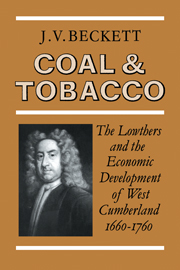Book contents
- Frontmatter
- Contents
- List of Tables
- List of Illustrations
- Note on Dates
- Preface
- INTRODUCTION
- 1 THE LOWTHERS: LANDOWNING-ENTREPRENEURS
- 2 COAL: MONOPOLY AND COMPETITION
- 3 COAL: THE STRUCTURE OF TRADE AND INDUSTRY
- 4 THE EXPANSION OF TRADE
- 5 THE DEVELOPMENT OF INDUSTRY
- 6 COMMUNICATIONS
- 7 CREATING NEW TOWNS: URBAN GROWTH
- CONCLUSION
- Appendix 1 The Lowther Family
- Appendix 2 Sir James Lowther's Investments
- APPENDIX 3 The Lowthers' Land Transactions
- Appendix 4 Colliery Figures
- Notes
- Bibliography
- Index
1 - THE LOWTHERS: LANDOWNING-ENTREPRENEURS
Published online by Cambridge University Press: 05 November 2011
- Frontmatter
- Contents
- List of Tables
- List of Illustrations
- Note on Dates
- Preface
- INTRODUCTION
- 1 THE LOWTHERS: LANDOWNING-ENTREPRENEURS
- 2 COAL: MONOPOLY AND COMPETITION
- 3 COAL: THE STRUCTURE OF TRADE AND INDUSTRY
- 4 THE EXPANSION OF TRADE
- 5 THE DEVELOPMENT OF INDUSTRY
- 6 COMMUNICATIONS
- 7 CREATING NEW TOWNS: URBAN GROWTH
- CONCLUSION
- Appendix 1 The Lowther Family
- Appendix 2 Sir James Lowther's Investments
- APPENDIX 3 The Lowthers' Land Transactions
- Appendix 4 Colliery Figures
- Notes
- Bibliography
- Index
Summary
The landowning-entrepreneur was a vital cog in the machinery of economic development. From the sixteenth century landowners can be found promoting new agricultural products and taking advantage of the growing demand for coal. Indeed, arguably their most important contribution to industrial development came before the main thrust of the industrial revolution, in the form of mineral exploitation. After all, they owned the resources, and they were more likely than any other section of the population to have the capital required for mining. By the later seventeenth century their influence was on the wane. Some landed men continued to operate mining concerns into the nineteenth century, but the majority had pulled out by then, happy to collect the income from a safe lease rather than risk further investment. The gentry of south-west Lancashire, for example, began their retreat in the 1730s, and had virtually abandoned the local coalfield to outside capital by 1800. For some of those owners who chose to remain, mining was merely an appendage, albeit an expensive one, to their estate affairs. But for the west Cumberland entrepreneurs, the Lowthers in particular, it was quite the opposite. Ostensibly the Lowthers were country gentlemen, absentee owners who left their large estate, mansion and home farm, in the care of a land steward for nine months of each year while they looked after the county's business in Parliament. In fact, this was a façade concealing a well-oiled business machine in which agricultural affairs played a distinctly secondary role to the chief enterprise, colliery development.
- Type
- Chapter
- Information
- Coal and TobaccoThe Lowthers and the Economic Development of West Cumberland, 1660–1760, pp. 13 - 37Publisher: Cambridge University PressPrint publication year: 1981



